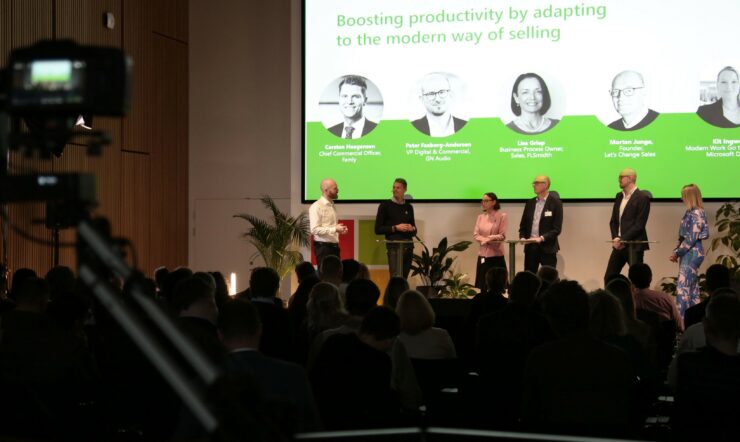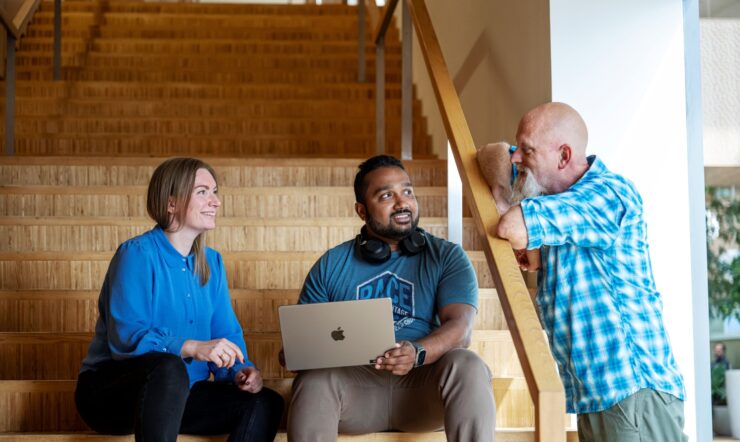On September 20th Microsoft Denmark hosted an event in which two speakers gave their perspectives on the financial institution of the future. During the session it became clear that the needs and priorities of the customers are changing rapidly – the question is how tech and AI can assist in making the business-critical transition.
The event Enabling Modern Customer Experience in Financial Services Industry went ahead as a strictly digital event where Microsoft’s Financial Services Industry Lead, Jacob Engsig was live from Microsoft Denmark’s HQ:
“Changes in customer preferences, new competition, and increasing cost and complexity from new regulation and compliance is challenging many financial institutions’ ability to deliver a personalized and efficient customer experience,” said Jacob Engsig in his introduction: “In these exerts it is vital to be attentive to the needs of clients, how they alter over time – and how financial institutions can leverage new technology to meet these demands”
Following his introduction, Jacob Engsig gave the floor to Stephen Alstrup, CEO and co-founder of Microsoft partner SupWiz. SupWiz has existed for five years and is arguably one of the leading AI startups on the European continent. Their clients are advised especially within the field of customer service.
The New School of Chatbots is More Chat and Less Bot
The SupWiz strategy is marked by a holistic approach. They do not focus on their client’s organization – rather they shift their attention to their customer’s customers.
“We need to have a user-centric approach. In the world of chatbots we can distinguish between the old-school and the new-school approach,” said Stephen Alstrup as he took the digital Teams stage: “An example of an old-school approach is a generic AI built around a decision tree. Here, the chatbot will be looking for specific keywords triggering the next branch of the tree. Both keywords and the metaphorical branches are invisible to the user.”
“So,” Stephen Alstrup continued: “it is left to the user to try and discern this invisible maze. This guessing game is the opposite of servicing the customer. Instead, we offer a new approach in which we pool together users with similar requests for the AI to make a qualified assessment of how to aid the customer.”
The point Stephen Alstrup made was not so much a point for his company as it was a point underlining the urgent need for user-centric approaches. Any organization that does not position itself in direct relation to its customers’ needs will be challenged. On the other hand, according to Stephen Alstrup, the user-centric approach will make you better acquainted with both your customers and your own organization: “Don’t make the users try to guess your organization’s language. You need to learn from the language of your users instead.”
This is not automation for the sake of automation. In fact, in Stephen Alstrup’s experience customers do not value the automation as they value the insights into data granted by AI: “With this approach you do not get an overview of what is going on within your company when it has already happened – you will get an overview as it is happening. You get insights into what is stirring the pot all around your organization. How happy are your customers? How are they referring to your company?”
Monitoring these conversations in real-time alerts the relevant departments when there is a spike in a certain behavior so the department can act as quickly as possible. This is the recipe for an agile company from Stephen Alstrup’s point of view.
Being a Digital Company Should Never Mean Being 100 Percent Digital
Following Stephen Alstrup’s presentation, Jacob Engsig passed the baton to Zubair Ahmed. Zubair Ahmed is the Managing Director of the Middle East and Africa region in VeriPark and the purpose of his presentation was to assess how a modern bank becomes the customer’s preferred financial institution – or PFI.
And the relevance of this assessment, as Zubair Ahmed pointed out, is hard to overstate seeing as more consumers than ever before want to leave the mega banks.
VeriPark uses Microsoft’s cloud platforms to ensure more engaging interactions with existing customers and potential customers. And one fundamental thing that financial institutions must realize is that the pandemic created lasting change in the marketplace, according to Zubair Ahmed. In fact, he talks about fundamental priorities in the life of the ordinary person being challenged:
“The challenge – even though it sprung from a medical crisis – left behind residual that is now showing in the behavior of the customer. Specifically, in banking, the likelihood of the customer jumping ship has increased drastically. The new normal isn’t one where the client asks, ‘Do you know me?’ but rather one where the client demands: ‘You should know me’. This is no longer a nice-to-have,” said Zubair Ahmed stressing that KYC should be a prime focus.
People Do Not Like Doing Banking – They Like Doing Life
It is not only customer loyalty that is decreasing these years. The traditional silos of the banking world are also being broken down. Realizing the move away from classic banking segments and towards a segment of one is key in understanding the new normal in which financial institutions find themselves, Zubair Ahmed points out:
“The question is whether my bank sees me as one persona with a variety of needs – or as four different personas with four different needs. Many banks are struggling with understanding that the modern customer’s needs will most likely not be met if they are contained in a single customer segment such as strictly retail or strictly private banking. Personalization is king,” said Zubair Ahmed also stressing the need for having the client at the center of every thought process.
So, how can modern financial institutions best meet these demands? In Zubair Ahmed’s opinion, Microsoft Cloud for Financial Services is a central part of establishing a 360-view of the client. Specifically, he mentioned four demands to live up to for the financial institution aspiring to become a PFI:
“Firstly, we must understand that the customer only expects to tell their story once. When they let you in on their given challenges it is expected that said challenges are taken care of,” said Zubair Ahmed as he continued: “Secondly, it is important for the bank to be proactive and not reactive. The customer expects guidance and advice before they ask for it.”
Arriving at his third point, Zubair Ahmed stressed the importance of digital interactions and the opportunities presented to collect KYC-data points: “Digital offers so many chances for us to improve our data and to serve our clients better. Even though every unique data point might not seem significant to the human eye, it is vital to understand that structuring this data gives you a far better chance of becoming the PFI,” said Zubair Ahmed before emphasizing the importance of the human touch:
“My fourth and final point is all about the human smile which cannot and should not be automated. Digital should never mean 100 percent digital. You must insist on making room for human interaction when a query is truly unique. The interaction with a client should start with a human smile and it should also be possible for it to end with a human smile, if necessary,” Zubair Ahmed said before ending the session with a sentence encapsulating his prioritization of customer experience: “What we need to understand is that basically, people don’t like doing banking. People like doing life. And while they are busy doing life, banking as a service simply happens.”

























